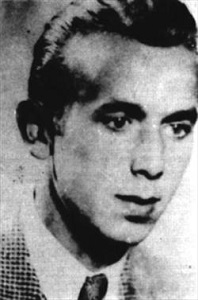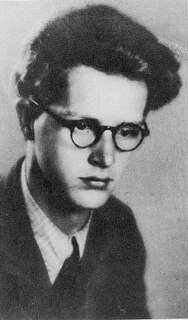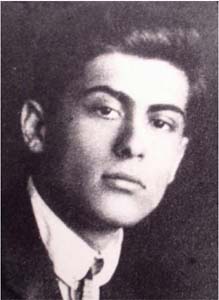 W
WAnte Bakotić was a Croatian Partisan known for marking the beginning of the 1945 breakthrough from the Jasenovac concentration camp by shouting "Forward, comrades!".
 W
WFrance Balantič was a Slovene poet. His works were banned from schools and libraries during the Titoist regime in Slovenia, but since the late 1980s he has been re-evaluated as one of the foremost Slovene poets of the 20th century.
 W
WJovo Bećir was a Montenegrin brigadier general and a colonel of the Royal Yugoslav Army.
 W
WAleksandar Berić was a Yugoslav naval officer who was killed during the Axis invasion of Yugoslavia in April 1941. As the captain of the Royal Yugoslav Navy river monitor Drava, he oversaw the downing of three Luftwaffe Junkers Ju 87 Stuka dive bombers on 12 April. Drava was eventually overwhelmed by the dive bombers, one of which scored a direct hit against her engine room. The ensuing explosion resulted in Drava's destruction, killing most of her crew. Berić either sank together with the ship or was killed by fifth columnists upon reaching the shore.
 W
WAntun Blažić was Croatian Jewish Partisan and People's Hero of Yugoslavia.
 W
WBoško Buha was a young Yugoslav Partisan and an honored icon of the Yugoslavian resistance during World War II.
 W
WEmin Duraku was a Yugoslavian partisan active during World War II, and a national hero of Albania.
 W
WMihailo Golubović was a Serbian and Yugoslav soldier and a Brigadier General of the Royal Yugoslav Army.
 W
WŽivorad "Žikica" Jovanović, better known as Španac was a Yugoslav partisan, Spanish-trained commando and republican volunteer in the Spanish Civil War and is credited for initiating the anti-fascist struggle in Yugoslavia during World War II. He was a skilled guerilla fighter and organizer of guerilla units in Serbia, largely tied to his intense wartime activities in Spain. Sometimes he is depicted as a man with PTSD like many Spanish international volunteers. He enjoyed enormous prestige in Yugoslav communist ranks, and in 1941 he even disobeyed direct orders of comrade Josip Broz Tito to leave from Serbia to Bosnia with his units. There are controversies about his death, tightly related to his conflict with Supreme Command during the war. History remembers him as a young idealist and a man who loved Spain.
 W
WIng. Mihajlo Klajn was a Yugoslav agronomist and communist who was killed during the Holocaust.
 W
WFranjo Kluz was a Yugoslav pilot from Bosnia and a People's Hero of Yugoslavia. He is best known as one of the founders of the Partisan air force, and served as an officer in No. 352 Squadron RAF.
 W
WSava Kovačević was a Yugoslav Partisan divisional commander during World War II, and one of the heroes of the communist Partisan movement.
 W
WIvan Goran Kovačić was a Croatian poet and writer.
 W
WJosip Kraš was a Croatian communist and partisan who died in World War II and was proclaimed a People's Hero of Yugoslavia.
 W
WSergej Mašera was a naval Lieutenant of the Yugoslav Royal Navy. At the end of the April War, Mašera, along with his fellow Lieutenant Milan Spasić, scuttled the destroyer Zagreb in the Bay of Kotor near Tivat to prevent its capture by the Italian Royal Navy. Both lieutenants died in the explosion, and were posthumously made members of the Order of the People's Hero.
 W
WVeselin Masleša was a Yugoslav writer, activist and Partisan.
 W
WVeselin Misita was a Bosnian Serb military commander holding the rank of lieutenant colonel during World War II.
 W
WLieutenant Colonel Zaharije Ostojić was a Montenegrin Serb and Yugoslav military officer who served as the chief of the operational, organisational and intelligence branches of the Chetnik Supreme Command led by Draža Mihailović in Yugoslavia during World War II. He was a major in the Royal Yugoslav Army Air Force prior to the Axis invasion of Yugoslavia, and was involved in the coup that deposed Prince Paul of Yugoslavia on 27 March 1941. After the coup, he escorted Prince Paul to exile in Greece, and was in Cairo during the invasion in April. In September 1941, he was landed on the coast of the Italian governorate of Montenegro along with the British Special Operations Executive officer Captain Bill Hudson and two companions. He escorted Hudson to the German-occupied territory of Serbia and introduced him to the Yugoslav Partisan leader Josip Broz Tito at Užice, then accompanied Hudson to Ravna Gora to meet Mihailović. Ostojić soon became Mihailović's chief of staff, and after the German attempt to capture the Chetnik leader during Operation Mihailovic in December 1941, brought the Chetnik Supreme Command staff to Montenegro where they were re-united with Mihailović in June 1942. During the remainder of 1942, Ostojić launched a counter-attack against Ustaše troops of the Independent State of Croatia returning to the eastern Bosnian town of Foča where they were expected to continue their genocidal anti-Serb policies. As many as 2,000 local Muslims were subsequently killed in the town by forces under Ostojić's command. Ostojić later oversaw large-scale massacres of civilians and burning of Muslim villages in the border region between Montenegro and the Sandžak.
 W
WBoško Palkovljević Pinki was a prominent Partisan fighter during World War II in Yugoslavia and a People's Hero of Yugoslavia.
 W
WVladimir Perić, best known by the nom de guerre Valter, was a Yugoslav Partisan commander in German-occupied Sarajevo during World War II.
 W
WSlobodan Princip, nicknamed Seljo (Сељо), was a Yugoslav Partisan fighter and the district staff chief of the Partisan Sarajevo area during World War II. He was posthumously awarded the Order of the People's Hero. He was the nephew of Gavrilo Princip.
 W
WDragoslav Račić was a Serbian Chetnik military commander holding the rank of colonel and voivode during World War II.
 W
WJoakim Rakovac was an Istrian anti-fascist, partisan and national hero of Yugoslavia. The circumstances of his death and the identity of his murderers are debated, and he is thought by some to have been murdered by the Yugoslav partisans.
 W
WIvan Rein was a Croatian Jewish painter.
 W
WIvan Ribar, known as Ivo Lola or Ivo Lolo, was a Yugoslav communist politician and military leader of Croatian descent. In the 1930s, he became one of the closest associates of Josip Broz Tito, leader of the Yugoslav Communist Party. In 1936, Ribar became secretary of the Central Committee of SKOJ. During World War II in Yugoslavia, Ribar was among the main leaders of the Yugoslav Partisans and was a member of the Partisan Supreme Headquarters. During the war, he founded and ran several leftist youth magazines. In 1942, Ribar was among the founders of the Unified League of Anti-Fascist Youth of Yugoslavia (USAOJ). He was killed by a German bomb in 1943 near Glamoč while boarding an airplane for Cairo, where he was to become the first representative of Communist Yugoslavia to the Middle East Command.
 W
WMilan Spasić was a naval Lieutenant of the Royal Yugoslav Navy. During the April War, Spasić, along with his fellow Lieutenant Sergej Mašera, scuttled the destroyer Zagreb in the Bay of Kotor near Tivat to prevent it from falling into the hands of the Italian Royal Navy. Both Spasić and Mašera died in the scuttling.
 W
WDrago Štajnberger was a Croatian Jewish Partisan and a People's Hero of Yugoslavia.
 W
WVera Jocić was a Yugoslav partisan and People's Hero of Yugoslavia.